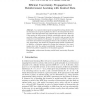Free Online Productivity Tools
i2Speak
i2Symbol
i2OCR
iTex2Img
iWeb2Print
iWeb2Shot
i2Type
iPdf2Split
iPdf2Merge
i2Bopomofo
i2Arabic
i2Style
i2Image
i2PDF
iLatex2Rtf
Sci2ools
116
click to vote
ICANN
2009
Springer
2009
Springer
Efficient Uncertainty Propagation for Reinforcement Learning with Limited Data
In a typical reinforcement learning (RL) setting details of the environment are not given explicitly but have to be estimated from observations. Most RL approaches only optimize the expected value. However, if the number of observations is limited considering expected values only can lead to false conclusions. Instead, it is crucial to also account for the estimator's uncertainties. In this paper, we present a method to incorporate those uncertainties and propagate them to the conclusions. By being only approximate, the method is computationally feasible. Furthermore, we describe a Bayesian approach to design the estimators. Our experiments show that the method considerably increases the robustness of the derived policies compared to the standard approach. Key words: reinforcement learning, model-based, uncertainty, Bayesian modeling
Related Content
| Added | 16 Aug 2010 |
| Updated | 16 Aug 2010 |
| Type | Conference |
| Year | 2009 |
| Where | ICANN |
| Authors | Alexander Hans, Steffen Udluft |
Comments (0)

